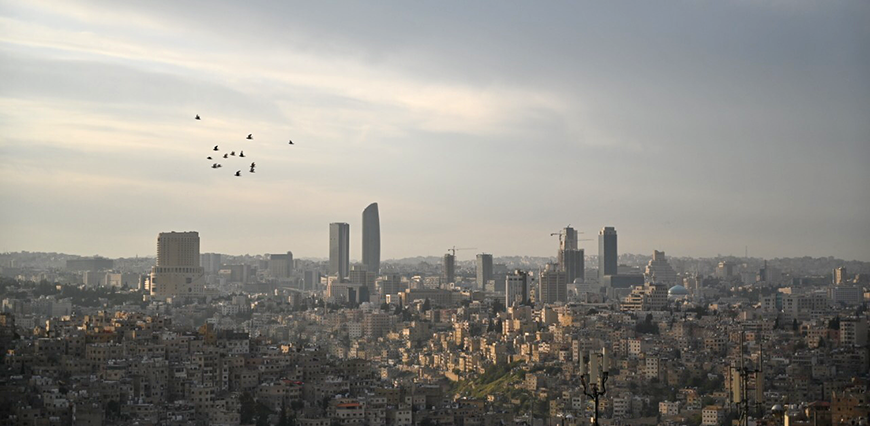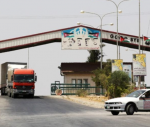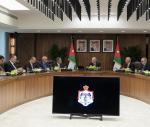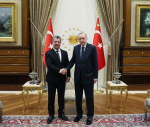You are here
IMF Executive Board approves $396m in emergency assistance to Jordan to address COVID-19 pandemic
By JT - May 22,2020 - Last updated at May 22,2020

Jordan has taken ‘proactive efforts’ since the COVID-19 outbreak to protect safety of its citizens and refugees, the International Monetary Fund said (File photo)
AMMAN — The Executive Board of the International Monetary Fund (IMF) on Wednesday approved Jordan’s request for emergency financial assistance under the Rapid Financing Instrument (RFI) equivalent to SDR 291.55 million (about $396 million, or 85 per cent of quota).
The purchase under the RFI is projected to cover about a quarter of Jordan’s external financing needs stemming from the COVID-19 shock, according to an IMF statement.
The rest is expected to be covered by Jordan’s development partners and by targeting smaller accumulation of reserves than under the arrangement under Extended Fund Facility (EFF) approved by the IMF on March 25, 2020, the statement said.
![]()
Jordan has taken “proactive efforts” since the COVID-19 outbreak to protect safety of its citizens and refugees. It has implemented a strict curfew, prioritised healthcare spending, and took steps to cushion the impact of the shock on businesses and households, read the statement.
Despite these efforts, Jordan’s near-term economic outlook has worsened considerably since the IMF approved a $1.3 billion four-year EFF for Jordan in March, noted the statement.
Due to the COVID-19 crisis and the strict lockdown measures to contain it, Jordan’s 2020 output is expected to contract, fiscal deficit is expected to widen, public debt to increase, and a $1.5 billion balance of payments gap to emerge, the IMF said in the statement.
The RFI and other external financing catalysed by it will ease the external financing constraint and allow the authorities to finance essential spending on health and social protection and avoid loss in official reserves. The authorities are committed to transparency and accountability for emergency spending.
Following the Executive Board discussion on Jordan, Mitsuhiro Furusawa, Deputy Managing Director, and Acting Chair, said: “The COVID-19 pandemic has had a severe impact on the Jordanian people’s lives and on the economy. Tourism disruption and sharp declines in remittances, exports and capital inflows have resulted in an urgent balance of payments need,” according to the statement.
“The Jordanian authorities have responded with decisive containment and health measures that effectively limited the spread of the virus with minimal fatalities. They also implemented a timely package of policies to mitigate the economic fallout of the pandemic. The government provided targeted financial support to the most severely impacted businesses and individuals, who lost their jobs and income, while the Central Bank of Jordan acted promptly to supply ample liquidity to banks, ease debt burdens and support SMEs,” he noted.
“All government spending is subject to audit by the Jordanian Audit Bureau. All emergency spending will be audited, and the audit results will be published in the interest of transparency and accountability,” Furusawa said.
“IMF financing under the Rapid Financing Instrument will support international reserves and help meet the budget financing needs for crisis mitigation. Mobilising additional financing from multilateral and bilateral creditors will be essential to support the authorities’ policy efforts and preserve macroeconomic stability,” he continued.
“The authorities remain committed to the objectives of the reform programme supported by the Extended Fund Facility arrangement, which was approved by the board in March. When the crisis abates, the priority will be resuming fiscal consolidation to place public debt on a declining path and pursuing reforms to strengthen the competitiveness of the Jordanian economy and to support inclusive growth and job creation,” he added.
Related Articles
AMMAN — The Executive Board of the International Monetary Fund (IMF) on Tuesday completed the first review of Jordan’s performance under the
AMMAN — The Jordanian economy has performed favourably under a difficult external environment, as macroeconomic stability and external viabi
AMMAN – The executive board of the International Monetary Fund (IMF) on Friday completed the seventh and final review of Jordan’s econo















